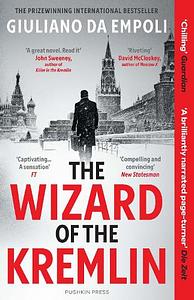Take a photo of a barcode or cover
emotional
informative
reflective
sad
fast-paced
Plot or Character Driven:
A mix
Strong character development:
Complicated
Loveable characters:
Complicated
Diverse cast of characters:
Yes
Flaws of characters a main focus:
Yes
Terrifiant - peut être à relire plus en détail quand je serais plus concentrée. Plus essai politique que roman.
// 'We' de Yevgeny Zamyatin (1920-21) : dystopie d'un régime totalitaire
// 'We' de Yevgeny Zamyatin (1920-21) : dystopie d'un régime totalitaire
Lu en français, merci loulou pour le prêt j’ai pas mal appris sur un truc qui m’intéresse pas à la base
informative
reflective
fast-paced
Plot or Character Driven:
A mix
Strong character development:
Yes
Loveable characters:
Complicated
Diverse cast of characters:
No
Flaws of characters a main focus:
Yes
informative
lighthearted
medium-paced
Plot or Character Driven:
Character
Strong character development:
No
Loveable characters:
No
Diverse cast of characters:
No
Flaws of characters a main focus:
Yes
dark
funny
mysterious
medium-paced
informative
reflective
medium-paced
Plot or Character Driven:
Character
informative
reflective
tense
medium-paced
Plot or Character Driven:
A mix
Strong character development:
Complicated
Loveable characters:
Complicated
Diverse cast of characters:
No
Flaws of characters a main focus:
Yes
‘Since Vadim Baranov quit his post as advisor to the tsar, stories about him had been multiplying rather than fading away.’
An interest in Yevgeny Zamyatin and his novel ‘We’ takes our unnamed narrator to Moscow. Here, a social media account in the name of Nikolai Brandeis, leads him to Vadim Baranov, once a Kremlin insider, known as the Wizard of the Kremlin. Over one evening, Baranov tells the story of his life as advisor to Vladimir Putin.
‘—And what do you see power as being?
—You’re asking too direct a question, he said. Power is like the sun, like death: you can’t look at it head-on. Especially in Russia. But since you’ve come all this way, and if you have some time, I’d like to tell you a story.’
Until the end, the story is Baranov’s. Baranov has seen different aspects of life in Russia: from the breakdown of the USSR, and the resulting humiliation. He speaks of his life, of his conformist Soviet father and his non-conformist grandfather. Baranov’s initial common ground with Putin was a desire to see Russia restored to its previous glory. Here, he speaks with Putin:
“If I might ask you a question, do you know who’s the greatest actress of all time?”
Putin shrugged impassively.
“Greta Garbo. And do you know why? Because an idol who withdraws from public view gains in power. Mystery creates energy. Distance fosters veneration. The imagination of Russian society, of any society, plays out in two dimensions. On the horizontal axis is proximity to everyday reality, while the vertical axis measures authority. […]”
Part Russian history lesson, part attempt to analyse Vladimir Putin, this novel takes us from the fall of the Soviet Union to the invasion of Ukraine. And Russia changes. The possibility of a path to democracy seems lost, while Putin becomes more powerful and enigmatic. Baranov, who has been by Putin’s side since he rose to power, refers to him as the tsar.
Among the many passages that caught my attention was this:
“If cannibals came to power in Moscow,” said the tsar on the flight home, “the United States would immediately recognize them as the legitimate government, as long as they didn’t interfere with American interests and continued to treat the U.S. as the boss. The problem is that they think they’ve won the Cold War. But the Soviet Union didn’t lose it. The Cold War stopped because the Russian people overthrew a regime that was oppressing them. We weren’t beaten, we freed ourselves from a dictatorship. Two different things.” […]’
Perspective is everything.
Yes, I enjoyed this novel.
Jennifer Cameron-Smith
An interest in Yevgeny Zamyatin and his novel ‘We’ takes our unnamed narrator to Moscow. Here, a social media account in the name of Nikolai Brandeis, leads him to Vadim Baranov, once a Kremlin insider, known as the Wizard of the Kremlin. Over one evening, Baranov tells the story of his life as advisor to Vladimir Putin.
‘—And what do you see power as being?
—You’re asking too direct a question, he said. Power is like the sun, like death: you can’t look at it head-on. Especially in Russia. But since you’ve come all this way, and if you have some time, I’d like to tell you a story.’
Until the end, the story is Baranov’s. Baranov has seen different aspects of life in Russia: from the breakdown of the USSR, and the resulting humiliation. He speaks of his life, of his conformist Soviet father and his non-conformist grandfather. Baranov’s initial common ground with Putin was a desire to see Russia restored to its previous glory. Here, he speaks with Putin:
“If I might ask you a question, do you know who’s the greatest actress of all time?”
Putin shrugged impassively.
“Greta Garbo. And do you know why? Because an idol who withdraws from public view gains in power. Mystery creates energy. Distance fosters veneration. The imagination of Russian society, of any society, plays out in two dimensions. On the horizontal axis is proximity to everyday reality, while the vertical axis measures authority. […]”
Part Russian history lesson, part attempt to analyse Vladimir Putin, this novel takes us from the fall of the Soviet Union to the invasion of Ukraine. And Russia changes. The possibility of a path to democracy seems lost, while Putin becomes more powerful and enigmatic. Baranov, who has been by Putin’s side since he rose to power, refers to him as the tsar.
Among the many passages that caught my attention was this:
“If cannibals came to power in Moscow,” said the tsar on the flight home, “the United States would immediately recognize them as the legitimate government, as long as they didn’t interfere with American interests and continued to treat the U.S. as the boss. The problem is that they think they’ve won the Cold War. But the Soviet Union didn’t lose it. The Cold War stopped because the Russian people overthrew a regime that was oppressing them. We weren’t beaten, we freed ourselves from a dictatorship. Two different things.” […]’
Perspective is everything.
Yes, I enjoyed this novel.
Jennifer Cameron-Smith
reflective
tense
medium-paced
Plot or Character Driven:
Character
Strong character development:
Complicated
Loveable characters:
No
Diverse cast of characters:
Complicated
Flaws of characters a main focus:
Yes



